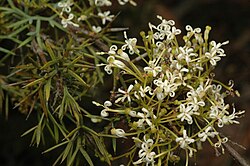Biology:Grevillea spinosissima
| Grevillea spinosissima | |
|---|---|

| |
| In the Australian National Botanic Gardens | |
| Scientific classification | |
| Kingdom: | Plantae |
| Clade: | Tracheophytes |
| Clade: | Angiosperms |
| Clade: | Eudicots |
| Order: | Proteales |
| Family: | Proteaceae |
| Genus: | Grevillea |
| Species: | G. spinosissima
|
| Binomial name | |
| Grevillea spinosissima McGill.[1]
| |
Grevillea spinosissima is species of flowering plant in the family Proteaceae and is endemic to the southwest of Western Australia. It is a spiny shrub with three-part leaves with sharply-pointed, linear lobes, and clusters of creamy-white and green to mauve flowers with a white style.
Description
Grevillea spinosissima is a spiny shrub that typically grows to a height of 0.5–1.6 m (1 ft 8 in–5 ft 3 in) and has irregular, often arching branches. Its leaves are 7–20 mm (0.28–0.79 in) long and simple or divided with three sharply-pointed, tapering to more or less linear lobes 4–15 mm (0.16–0.59 in) long and 0.7–1.4 mm (0.028–0.055 in) wide. The edges of the leaves are rolled under, enclosing the lower surface apart from the midvein. The flowers are mostly borne in leaf axils in a more or less spherical raceme up to 15 mm (0.59 in) long, the flowers at the base of the clusters flowering first. The flowers are creamy-white and green to mauve with a tapering white style, the pistil 3.4–4.1 mm (0.13–0.16 in) long. Flowering mainly occurs from June to September and the fruit is a wrinkled, oval or oblong follicle 7–8 mm (0.28–0.31 in) long.[2][3][4]
Taxonomy
Grevillea spinosissima was first formally described in 1986 by the botanist Donald McGillivray in his book New Names in Grevillea (Proteaceae) from specimens he collected with Alex George near Manmanning in 1976.[5] The specific epithet (spinosissima) is means "very spiny", referring to the leaves.[3][6]
Distribution and habitat
This grevillea grows in heath, shrubland, or open shrubby woodland, sometimes in disturbed areas and is found from Wongan Hills to near Quairading and York in the Avon Wheatbelt, Geraldton Sandplains and Jarrah Forest bioregions of south-western Western Australia.[2][4]
Conservation status
This grevillea is listed as "not threatened" by the Government of Western Australia Department of Biodiversity, Conservation and Attractions.[4]
See also
References
- ↑ "Grevillea spinosissima". Australian Plant Census. https://biodiversity.org.au/nsl/services/apc-format/display/63793.
- ↑ 2.0 2.1 "Grevillea spinosissima". Australian Biological Resources Study, Department of Agriculture, Water and the Environment: Canberra. https://profiles.ala.org.au/opus/foa/profile/Grevillea%20spinosissima.
- ↑ 3.0 3.1 Wrigley, John W.; Fagg, Murray A. (1991). Banksias, waratahs & grevilleas : and all other plants in the Australian Proteaceae family. North Ryde, NSW, Australia: Angus & Robertson. p. 334. ISBN 0207172773.
- ↑ 4.0 4.1 4.2 "Grevillea spinosissima". FloraBase. Western Australian Government Department of Parks and Wildlife. https://florabase.dpaw.wa.gov.au/browse/profile/2095.
- ↑ "Grevillea spinosissima". APNI. https://id.biodiversity.org.au/instance/apni/469960.
- ↑ Sharr, Francis Aubi; George, Alex (2019). Western Australian Plant Names and Their Meanings (3rd ed.). Kardinya, WA: Four Gables Press. p. 311. ISBN 9780958034180.
Wikidata ☰ Q15582793 entry
 |

